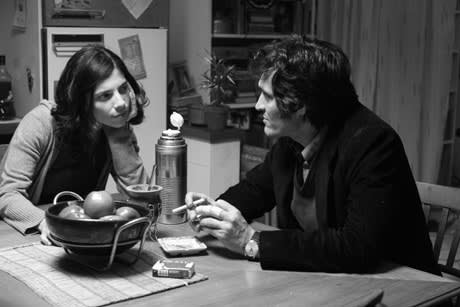Having divorced himself from his family, Angelo Tetrocini (Vincent Gallo) holes up in an impossibly quaint Our Town-version of Buenos Aires, reinventing himself as "Tetro." Unpublished and emotionally fraught, Tetro's the kind of self-styled Lost Generation exile who knows that when it comes to being a writer, behaving like a miserable prick takes priority over actually writing anything. But Tetro's comfortable despondence and clean break from his past are foiled when his baby-faced younger brother Bennie (Alden Ehrenreich) tracks him down while marooned in Argentina.
As a cottage melodrama about the uneasy reunion between two brothers, Tetro kicks off plainly enough. But it's not long until Coppola runs the whole thing off the rails, overloading his film with strained family drama and all kinds of other highfalutin' operatics. Unfolding as an index of popular themes in Western art over the past couple centuries, Tetro shows shades of everything from Karamazov-indebted patricidal fantasy to Five Easy Pieces-styled class anxiety to a sibling rivalry that echoes the Mozart/Salieri dynamic.
Coppola is still trapped in the narrative muck of Youth Without Youth (2007), though here his apparent want to return to a more vanguard, film school sort of exposition reaches a frenzy of satirical decadence that allows Tetro to exceed the sum of its borrowed parts. Like a Guy Maddin film with more austere influences, Tetro's restyling of literature, cinema and ballet's more timeless themes practically screams: "Secrets! Revenge! Intrigue!" Tetro may be guilty of being derivative but it goes through the motions with bombastic aplomb.
As expected, Coppola proves deserving of his repute as one of American cinema's master stylists, framing his shots with trademark precision. Shame that it's all just upholstery, lavish dressing for a film that's essentially motivated by a string of undeserved plot twists and motor vehicle collisions. It does nothing to substantially remedy Coppola's status as an irrelevant American master, but if you're willing to abandon yourself to its variously asinine excesses, Tetro offers some beautifully shot, slack-jawed fun.
(Mongrel Media)As a cottage melodrama about the uneasy reunion between two brothers, Tetro kicks off plainly enough. But it's not long until Coppola runs the whole thing off the rails, overloading his film with strained family drama and all kinds of other highfalutin' operatics. Unfolding as an index of popular themes in Western art over the past couple centuries, Tetro shows shades of everything from Karamazov-indebted patricidal fantasy to Five Easy Pieces-styled class anxiety to a sibling rivalry that echoes the Mozart/Salieri dynamic.
Coppola is still trapped in the narrative muck of Youth Without Youth (2007), though here his apparent want to return to a more vanguard, film school sort of exposition reaches a frenzy of satirical decadence that allows Tetro to exceed the sum of its borrowed parts. Like a Guy Maddin film with more austere influences, Tetro's restyling of literature, cinema and ballet's more timeless themes practically screams: "Secrets! Revenge! Intrigue!" Tetro may be guilty of being derivative but it goes through the motions with bombastic aplomb.
As expected, Coppola proves deserving of his repute as one of American cinema's master stylists, framing his shots with trademark precision. Shame that it's all just upholstery, lavish dressing for a film that's essentially motivated by a string of undeserved plot twists and motor vehicle collisions. It does nothing to substantially remedy Coppola's status as an irrelevant American master, but if you're willing to abandon yourself to its variously asinine excesses, Tetro offers some beautifully shot, slack-jawed fun.
